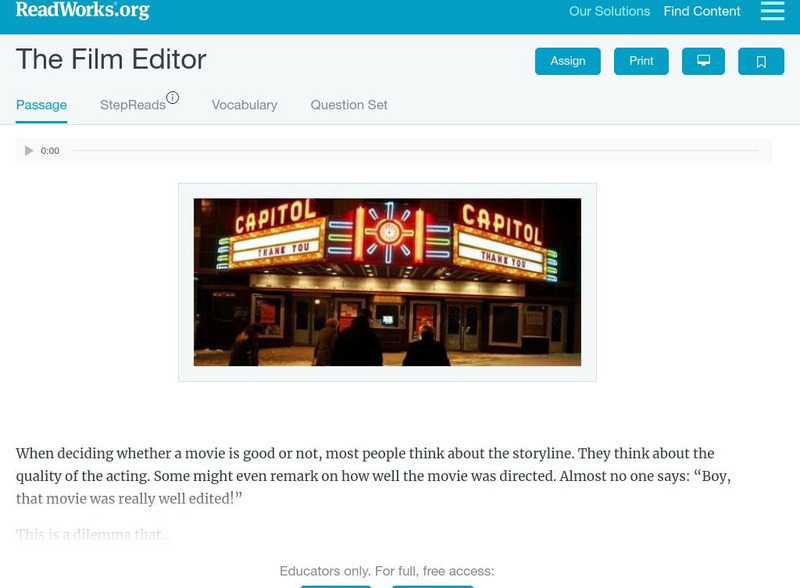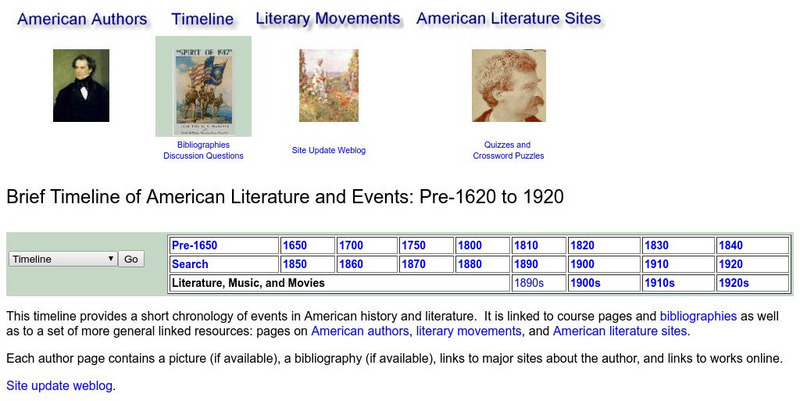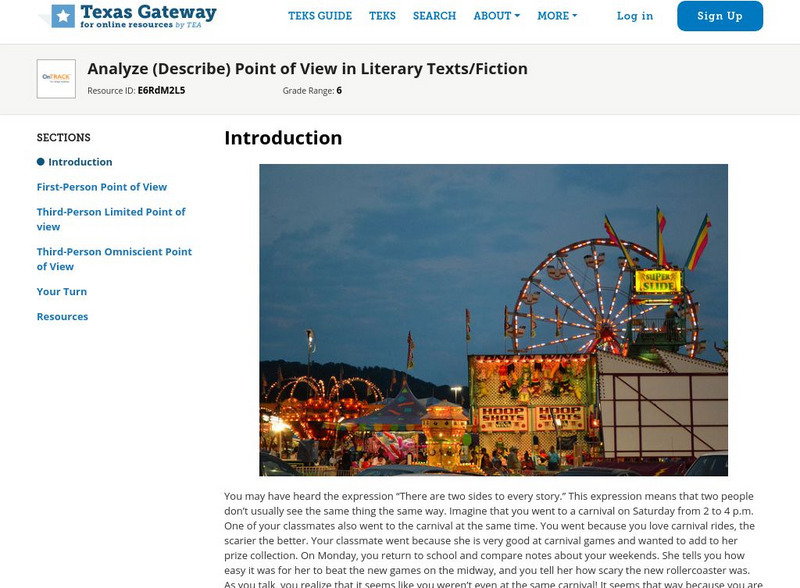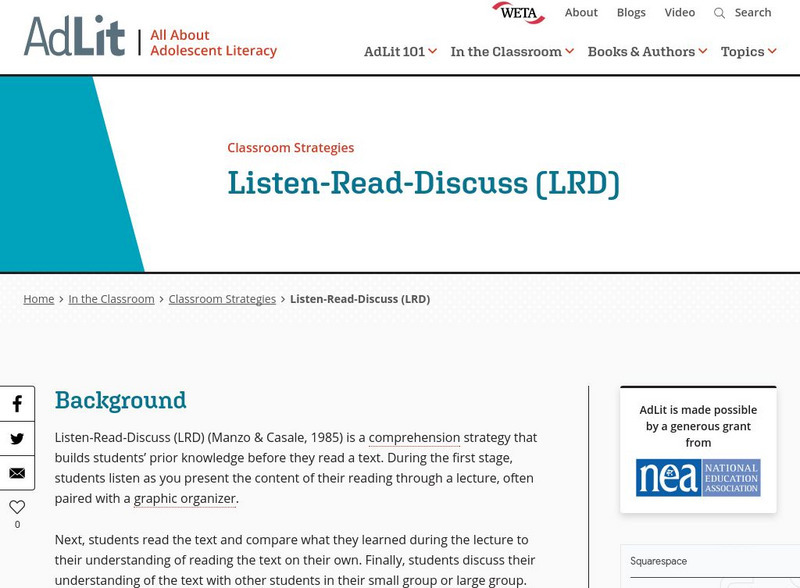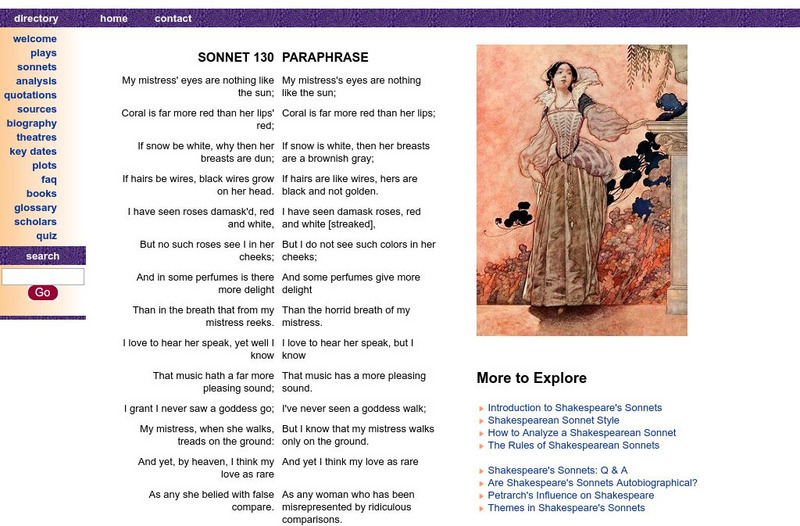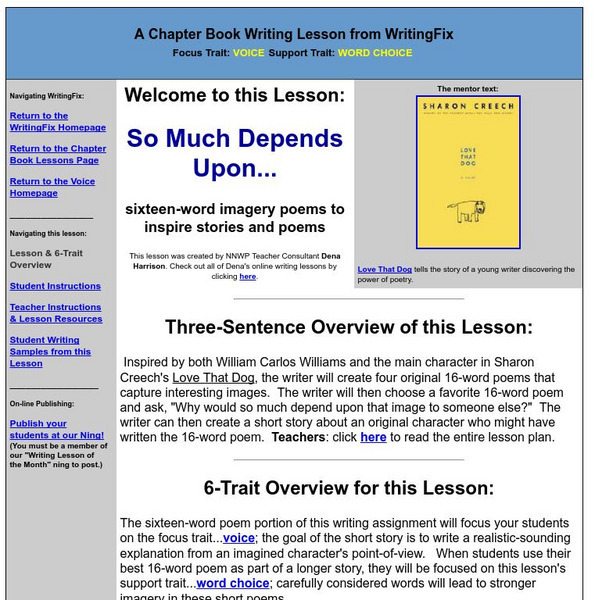National Endowment for the Arts
National Endowment for the Arts: The Big Read: Jeffers: Poetry
Guide to the poetry of Robinson Jeffers, including historical information, biographies, discussion questions, and lesson plans. Each one of ten lesson plans has discussion activities, writing exercises, vocabulary, and homework...
Read Works
Read Works: Passages: The Mountain
[Free Registration/Login Required] Students read a fiction text about an unexpected love and answer questions about comprehension, setting, vocabulary, transitions, and more. A paired text and questions are also available.
Read Works
Read Works: Passages: The Film Editor
[Free Registration/Login Required] Students read a nonfiction text about the job of a film editor and answer questions about comprehension, supporting details, inferencing, main idea, and more. Links to a paired text and paired text...
Read Works
Read Works: Passages: The Process of Acting
[Free Registration/Login Required] Students read a nonfiction text about what it takes to be an actor and answer questions about comprehension, main idea, supporting details, vocabulary, transitions, and more. Links to a paired text and...
Annenberg Foundation
Annenberg Learner: Literature: Describing Setting
Short explanation of setting as a literary term. Written in the context of "What makes a good short story?" A link at the bottom of the page leads to additional information about setting.
ReadWriteThink
Read Write Think: Discovering a Passion for Poetry W/ Langston Hughes
After analyzing examples of contemporary youth poetry as well as the poetry of Langston Hughes, students will use the Internet to conduct research on how events in the world have shaped Hughes' work. They will cite specific examples that...
Texas Education Agency
Texas Gateway: Themes in Literary Texts (English 6 Reading)
Learn how to infer the implicit theme in a work of fiction, distinguish theme from topic, and make complex inferences using textual evidence.
Washington State University
Washington State University: Literary Movements: Brief Timeline of American Literature
This Washington State University site provides a decade-by-decade timeline of American literature with historical events going on at the same time. Most topics on the timeline are links to additional information about the author, work,...
Scholastic
Scholastic: Reading the Play
This comprehensive lesson plan uses Julius Caesar to teach multiple author tools such as figurative language and foreshadowing. Included are reproducibles, activities for each act, lesson plan extensions, ideas for different learning...
CommonLit
Common Lit: Where Did I Come From
CommonLit.org is a wonderful resource to use in a Language Arts classroom. Each story or article is accompanied by guided reading questions, assessment questions, and discussion questions. In addition, students can click on words to see...
Texas Education Agency
Texas Gateway: Describe Themes in Literary Texts (English 7 Reading)
[Accessible by TX Educators. Free Registration/Login Required] This lesson is about themes, the central messages in literature. Whatever their genre might be, writers have some wisdom, some universal truth or insight to share; this...
Texas Education Agency
Texas Gateway:analyze (Describe) Point of View in Literary Texts/fiction
In this learning module, students will learn to analyze fiction told from the first-person, third-person limited, and third-person omniscient points of view.
Other
Wisewire: Grade 7 Playlist: Historical and Literary Comparisons
Students will learn how to compare and contrast a fictional portrayal of a time, place, or character and a historical account of the same period as a means of understanding how authors of fiction use or alter history. Included are lesson...
Encyclopedia Britannica
Encyclopedia Britannica: Guide to Shakespeare
Huge resource of information on Shakespeare, his times, and his works from "Encyclopaedia Britannica." Includes a chronology, biography, glossary, some learning activities, and more. Be sure to check out the "Multimedia" section for...
The Newberry Library
Newberry: Shakespeare's the Tempest and Utopias of the European Renaissance
Newberry Library learning module uses primary source material of Shakespeare in a lesson on how Renaissance writers and artists portrayed European exploration of America. Students read excerpts from works of Renaissance literature to...
PBS
Pbs Learning Media: Literary Elements and Techniques Collection
These animated shorts introduce or review literary elements and techniques like theme, setting, figurative language, characterization, and conflict. They can be used when students are just learning how to identify the most commonly used...
PBS
Pbs Learning Media: Storytelling With Words and Pictures
In this interactive lesson plan, students learn the basics of how stories are structured, gain vocabulary about storytelling elements, and explore how the arts, specifically drawing, can be a valuable way for students to tell stories.By...
AdLit
Ad lit.org: Classroom Strategies: First Lines
First Lines is a strategy in which students read the beginning sentences from assigned readings and make predictions about the content of what they're about to read. This pre-reading technique helps students focus their attention on what...
AdLit
Ad lit.org: Classroom Strategies: Listen Read Discuss (Lrd)
Listen-Read-Discuss (LRD) (Manzo & Casale, 1985) is a comprehension strategy that builds students' prior knowledge before they read a text. During the first stage, students listen as you present the content of their reading through a...
Shakespeare Online
Shakespeare Online: Analysis of Shakespeare's Sonnet 130
This analysis begins with a paraphrase of the poem and a glossary of unfamiliar terms. There follows a brief, clear analysis of the poem which focuses on Shakespeare's twist on conventional sonnet imagery.
Writing Fix
Writing Fix: So Much Depends Upon
In this lesson young scholars will write a descriptive short story based upon 16-word imagery poems they have previously written.
Vocabulary.com
Some Helpful Poetry Terms
This site contains a list of 24 poetry terms. Teachers can digitally assign this list to their students to reinforce the spellings, pronunciations, and meanings of these words
Folger Shakespeare Library
Folger Shakespeare Lib.: Shakespeare for Kids: Shakespearean Compliments [Pdf]
Helpful chart for creating honeyed phrases to compliment your friends and classmates in language that Shakespeare would have used.
E Reading Worksheets
E Reading Worksheets: Genre Activities
This learning module features "genre" as the topic for PowerPoint presentations, lessons, and quizzes. Numerous projects with the "genre" theme are available for further exploration as opportunities for more in-depth investigations.





